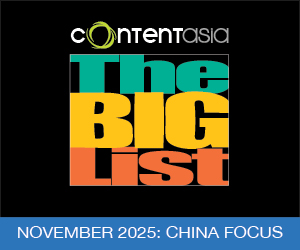
Fremantle was Asia’s top formats distributor this year, closing October with 60 formats either on air in 2018 or commissioned for 2019, and maybe a couple more before the year is out. Just under 70% of the titles are pure licensing deals, with local shops and/or broadcasters taking the production lead. Fremantle’s Ganesh Rajaram and Haryaty Rahman talk about the great leap forward.
Fremantle’s Asia formats business has overtaken fierce rival Endemol Shine in the region, surging into first place for the first time during the first half of this year, and maintaining the position for the 10 months to end October (see page 102 for ContentAsia Formats Outlook full Leaderboard). Fremantle moves into the end of 2018 with 60 formats either on air or commissioned for next year, and with rumours of one more big licensing deal before the lights go out on 2018. Just under 70% of the titles – 41 out of 60 – are from pure licensing markets, including Thailand, Vietnam, Mongolia, Cambodia and Myanmar. The other 19 are from Indonesia, India and China, where Fremantle maintains production units reporting to Australia.
The titles that propelled the U.K. indie to top spot in Asia include everything from first seasons such as Boxing Glove Vietnam to long-running returns, such as The Price is Right, also in Vietnam. Formats from production centres include the 19th/20th season of Family Feud Indonesia, season one of Kids Got Talent in China and Distraction Bengali in India.
Fremantle’s Asia GM/sales EVP, Ganesh Rajaram, is very clear about the reasons for the great leap forward: Fremantle’s restructure about two years ago that shuttered regional production activities, a refocus on pure licensing and an attitude is that no market is too small to warrant a smile and a visit.
“These markets are pretty sophisticated in terms of economies of scale. They have production companies that have been producing for broadcasters and platforms for years, they have leverage, they can easily produce the shows themselves,” Rajaram says.
And they have, even in developing markets once considered not lucrative enough. On a trip to Myanmar for the Myanmar Idol finale, hotel staff recognised Rajaram from the live studio aud...
Fremantle was Asia’s top formats distributor this year, closing October with 60 formats either on air in 2018 or commissioned for 2019, and maybe a couple more before the year is out. Just under 70% of the titles are pure licensing deals, with local shops and/or broadcasters taking the production lead. Fremantle’s Ganesh Rajaram and Haryaty Rahman talk about the great leap forward.
Fremantle’s Asia formats business has overtaken fierce rival Endemol Shine in the region, surging into first place for the first time during the first half of this year, and maintaining the position for the 10 months to end October (see page 102 for ContentAsia Formats Outlook full Leaderboard). Fremantle moves into the end of 2018 with 60 formats either on air or commissioned for next year, and with rumours of one more big licensing deal before the lights go out on 2018. Just under 70% of the titles – 41 out of 60 – are from pure licensing markets, including Thailand, Vietnam, Mongolia, Cambodia and Myanmar. The other 19 are from Indonesia, India and China, where Fremantle maintains production units reporting to Australia.
The titles that propelled the U.K. indie to top spot in Asia include everything from first seasons such as Boxing Glove Vietnam to long-running returns, such as The Price is Right, also in Vietnam. Formats from production centres include the 19th/20th season of Family Feud Indonesia, season one of Kids Got Talent in China and Distraction Bengali in India.
Fremantle’s Asia GM/sales EVP, Ganesh Rajaram, is very clear about the reasons for the great leap forward: Fremantle’s restructure about two years ago that shuttered regional production activities, a refocus on pure licensing and an attitude is that no market is too small to warrant a smile and a visit.
“These markets are pretty sophisticated in terms of economies of scale. They have production companies that have been producing for broadcasters and platforms for years, they have leverage, they can easily produce the shows themselves,” Rajaram says.
And they have, even in developing markets once considered not lucrative enough. On a trip to Myanmar for the Myanmar Idol finale, hotel staff recognised Rajaram from the live studio audience the night before. “Myanmar came to a standstill to watch Idol,” he says. In Cambodia, Prime Minister Hun Sen supported Hang Meas’ Cambodian Idol on social media and the crowd went wild.
“All we needed to do was license to the right partners,” says Haryaty Rahman, Asia distribution SVP. Rajaram adds: “Three or four years down the road, we are seeing multiple successful seasons. And that’s really redefined the format business for Asia. We were successfully before, but we weren’t prolific.”
Rahman sold the first format into Mongolia, then a remote market with big ambitions but little experience. With Got Talent, Mongol TV took advantage of every format spec. Season three upped the ante, leapfrogging Asia and taking its cue from the more costly Britain’s Got Talent. “They’re coming back year after year... They’re willing to invest in what goes on screen,” Rahman says, adding that strong relationships in the finished tape business also support format sales.
The second reason behind Fremantle’s performance is – unsurprisingly – the strength of the IP. “It helps that we have Got Talent, Idol, X Factor and even smaller shows like Family Feud and The Price is Right,” both Rajaram and Rahman say. “These are tried and tested, trusted brands”. And they’re working. Hang Meas in Cambodia is building a bigger studio, installing new tech. “Their ambition is remarkable,” Rajaram says. So is their growing confidence, which benefits the entire industry.
The third reason behind Fremantle’s winning run is its use of tech innovation and social media. “It’s no accident that The Sacred Riana became the number one clip of all time on Facebook,” Rajaram says, highlighting Fremantle’s early engagement with YouTube and drawing a digital line that stretches between Singapore and Fremantle teams around the world.
So far, format demand has been for non-scripted, with a smattering of requests for scripted, Rahman says. The appetite for classics like Family Feud is constant, and there’s an increase in demand for medium-sized easy-to-produce non-prime-time formats, like The Noise.
Not every part of Asia’s map is equally lit up. Rajaram is realistic about opportunities in places like Korea, where Korea’s Got Talent was once one of Fremantle’s biggest shows. That ended with K-pop/drama, and for now there are low to no expectations of a revival.
Streaming platforms, on the other hand, are cause for optimism, particularly with Viu acquiring scripted rights for Endemol Shine’s The Bridge, and aligning with Media Prima and HBO Asia.
Will streamers have a long-term impact?
“I hope so,” Rajaram says. “We would love to see more collaboration, where streaming platforms work with free-to-air stations and pan-regionals. It’s ideal, but you have to be less precious about where it’s shown first... The whole notion of collaboration, how you fund programmes, all of that needs to change.” It will, he says, adding: “The market will dictate that.”
Published in Issue Seven of ContentAsia's in-print + online 2018 (December 2018)






























